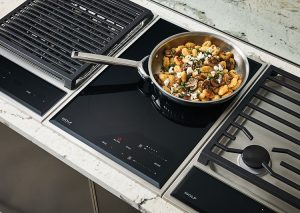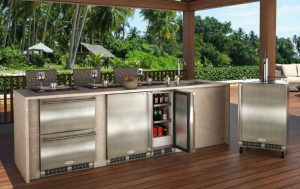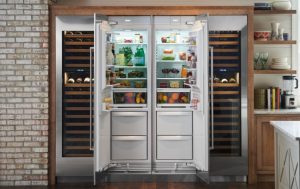Everything You Need to Know About Induction Cooktops

The kitchen is often considered the most important room in the home. It is where we store, prepare and create foods that our families can enjoy. So, to make this process as straightforward and easy as possible, you need to ensure that you have access to the best kitchen equipment and an induction cooktop should play a big role. Induction cooktops use magnetic induction rather than the direct thermal heat transfer used by traditional cooktops. The magnetic field heats the cooking vessel directly and can offer impressive heat capability. So, here we’ll explore everything you need to know about induction cooktops to help you make your purchase decision.
The Advantages of Induction
Induction offers some impressive advantages that make these types of cooktop an excellent choice for busy, family homes. This includes:
- Greater efficiency: Induction is one of the most efficient types of cooking equipment on the market. Little or no heat is wasted when cooking, so the units are as much as 70% more efficient compared to standard cooking methods. This adds up to some serious energy savings.
- Increased Safety: Every keen cook has experienced a burn or two when preparing a meal, but this risk is reduced when you have an induction cooker. Most of the cooktop remains cool, as only the cooking vessel is heated. This means that it is far safer, particularly if you have small children in your kitchen, as there is less chance of little fingers being burned. This also makes cleaning your cooktop easier, as any spills will not get burned on to the surface and can just be wiped clean with a damp cloth.
- Versatility: Many people assume that you have to have special cookware to use on an induction cooktop, but in fact, there are many types of cookware that can be used. Iron, enameled steel and aluminum are all compatible and will produce strong results. So, you may not even need to upgrade your pots and pans.
The Potential Downsides
Unfortunately, there are some potential disadvantages associated with induction cooktops that you should be aware of to make an informed purchase decision. These include:
- No power= No cooking: Unlike gas cookers, induction completely relies on having an electricity supply. So, if the power goes out, you won’t be able to cook anything.
- Some Noise: While they are not exactly noisy, induction does produce some noise when in use. Whenever your induction cooktop is on, there will be a low level of noise produced.
- Potential for Damage: Finally, some materials can cause damage to your induction cooktop, leading to expensive repairs or the need to replace your entire appliance. For example, aluminum foil can cause damage if placed in contact with the cooktop, so it needs to be used with care.
Additional Features
There are also many different features available on different induction cooktop models. So, here we’ll help you to understand some of the features that may be of benefit in your kitchen.
- Safety Sensors: Many induction cooktop models feature sensor technology to elevate safety. For example, many models feature pan detectors that can determine if a pan has been placed on the cooktop and will not allow the plate to activate if there is no pan. Some models also feature a pan status sensor that will automatically lower the heat if the pan is detected as empty to prevent damage to your cookware.
- Warming: You won’t always want intense heat, so a warming option can make it easier to warm something or keep it warm.
- Auto Switch Off: Some models will automatically shut off the heat to prevent overheating. This will begin the process or reducing the residual heat on your cookware and can provide a safeguard against potential damage and dangerous situations.
If you’re considering upgrading your oven and cooktop, you can explore your options with this online collection of induction ovens and ranges, or speak to a home appliance specialist for additional help and guidance.
- How to Design a Year-Round Outdoor Kitchen in Southern California
- What Are Flush-Mount Appliances: Flush-Mount Appliances Explained
- What Appliance Brands Hold Their Value the Longest
- Designing the Ultimate Outdoor Bar: Must-Have Appliances for Year-Round Fun
- Luxury Refrigerator Guide 2025: Built-In vs. Freestanding and What to Know Before You Buy
- How Smart Appliances Are Changing Luxury Kitchen Design in 2025
- The Ultimate Outdoor Grill Guide for 2025: Built-In vs. Freestanding
- Smart Bathroom Faucets & Fixtures in 2025: Blending Technology with Luxury Design
- Built-In Coffee Machines: Are They Worth It for Your Kitchen in 2025?
- How to Choose the Right Dishwasher for Your Home: Noise, Capacity, and Features Explained






